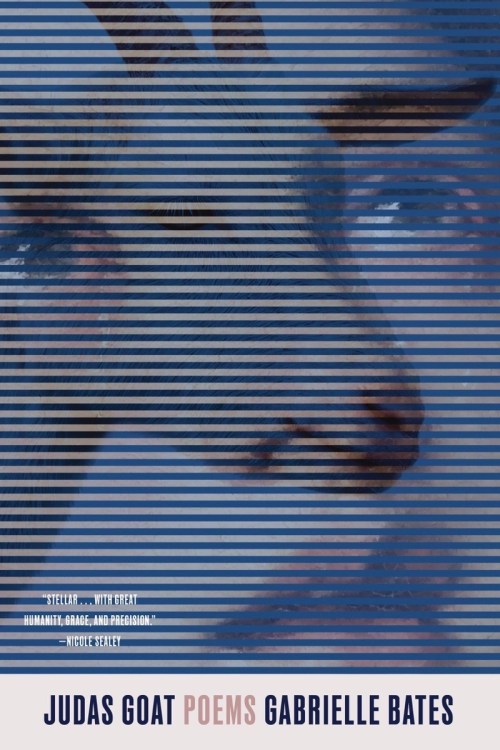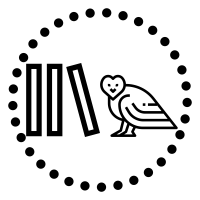[ad_1]
Already a finalist for the Ruth Lilly and Dorothy Sargent Rosenberg Poetry Fellowship, as well as a co-host of The Poet Salon podcast, it’s hard to believe that Judas Goat is Gabrielle Bates’s debut collection. The two-score poems within display a sensitive and assured voice and a candid exploration of human relationships and the self via mythologies, philosophies, and vulnerable narratives. The title suggests the stakes of such an excavation: the ostensibly domesticated Judas goat guides other animals to their end yet remains free and safe—or relatively free and safe, with a reality that is far more complex. The metaphor asks a pressing question: at what price do we fit into a society that may value us only as a tool to achieve a desperate, dreadful outcome? How are we haunted by our past experiences, and how do they impact our actions, and sometimes painful inactions?
Often, Bates wields brevity so sharp it leaves one breathless, with layers of meaning appearing like invisible ink under a lightbulb with each re-reading. Here from “Impermanent:”
“As a child I was forced
to make a show of saying
I love you, day after day
to a woman with cruel blue eyes.
Now, I say it to you,
and you say it to me.”
I’m taken with how time moves in these three couplets; the first reminding us of the lack of agency of childhood, the enforced submission. The second raises the terms—and cost—of what it is to be encaged by such words, how meaning is divorced from language, the repetitions of words like blows. Not to mention, the “woman”: though there is no added descriptive, it distinctively feels a mother figure, if not a maternal one; yet another disruption between form and function. Those two couplets would be enough to root a memorable image. But Bates adds a third that moves forward in time, haunted by the past—that encompasses both the wariness about the phrase, the weighted expectations, as well as what might be hope for a true response. Together, they examine the nuances and conflicts of relationships, memories, and language, unforgettably.
“If I describe something, anything, long enough, / language will lead me back to wanting it” Bates writes in “The Bridge,” and throughout the collection there’s both an embrace of and wariness about language. Language is a sly tempter, like that Judas goat, sometimes drawing one into unsettling, harmful engagement, often repetitively, though one knows better. Yet in the right hands—such as with a poet as talented as Bates—it also provides connection and perhaps, truth. From the title poem:
“We, of our ends, are perhaps all this oblivious: one goat
trained to live with the sheep, neck-bell jingling
in and out of the slaughterhouse.”
One wonders if these are the only options in our era: are we the Judas goat, the sheep, or both? The sacrificed or the betrayer? And does oblivion, willful or otherwise, absolve us of our actions? Do these roles—forced upon us literally or figuratively—make us unable to trust in our instincts? Those who survive are often both sensitive and scarred, on high alert, even when conditions may not require it. In “Dear Birmingham,” the speaker is aware of such:
“I was once so terrified of my own contentment
I bit my shoulder
and drew blood there
to the surface—past it—
What I have wanted most
is many lives. One for each longing,
round and separate.”
What happens when our wounds go through the surface, and worse, are self-committed? In this case, the “I” of the speaker uses language to lay bare the truth behind social veils we must don, to express agency. Mary Oliver may have famously asked “Tell me, what is it you plan to do / with your one wild and precious life?”, and Bates follows that middle open-ended statement—“past it”—with a swerve into a new hunger, an expansive one. As one who has had chapters of my “expected” life end or never begin, sometimes on my terms and sometimes not, this resonated deeply. Oh, the many lives we might experience if not tightly bound to expectations, or exterior forms and roles. I also admit a special delight in considering such longings “round and separate,” like the open mouths of a nest of birdlings, waiting to be fed, waiting to take flight.
One of the longer poems in the collection is “Eastern Washington Diptych,” which entwines questions, memories, and statements, seemingly converging on a point in the distance, regarding loss and restoration, surrender and survival, the many faces of truth, and what we can endure.
“Without violence, how do I understand my life as meaningful?
As if the only tool I owned for finding truth were a knife.
Go as far as you can with that tool, says a voice in my head, then bury it and pick up something else.
There are so many narratives, and each one obscures meaning.
[…]
Time and place are traps.
[…]
My mother texts to ask if I have a minute. My mother, my mother—
How do I grieve the loss of something that’s been returned to me?”
What are the stories we are told, and tell ourselves? Bates’s deeply intimate contemplations employ nature, history, location, Biblical figures—in “Conversation with Mary” the speaker asks: “Did you consider yourself a woman or a child before this” and the reply is a quiet “yes”— to consider the thresholds women walk through, or are shoved through, and the consequences. Many of the speakers feel as if they are in a conversation with each other, even as they occupy separate lives, poems, and pages. In “Tithes” the speaker asks:
“What could be
less permanent
than being only
a daughter to men”
Again with no punctuation and a sparking friction, there are a multitude of answers, and none. Judas Goat offers one definitive statement though: this is a noteworthy debut, and confirmation of Bates’s talent, heart and place in contemporary poetry.

POETRY
Judas Goat
by Gabrielle Bates
Tin House Books
Published January 24, 2023

[ad_2]
Source link

